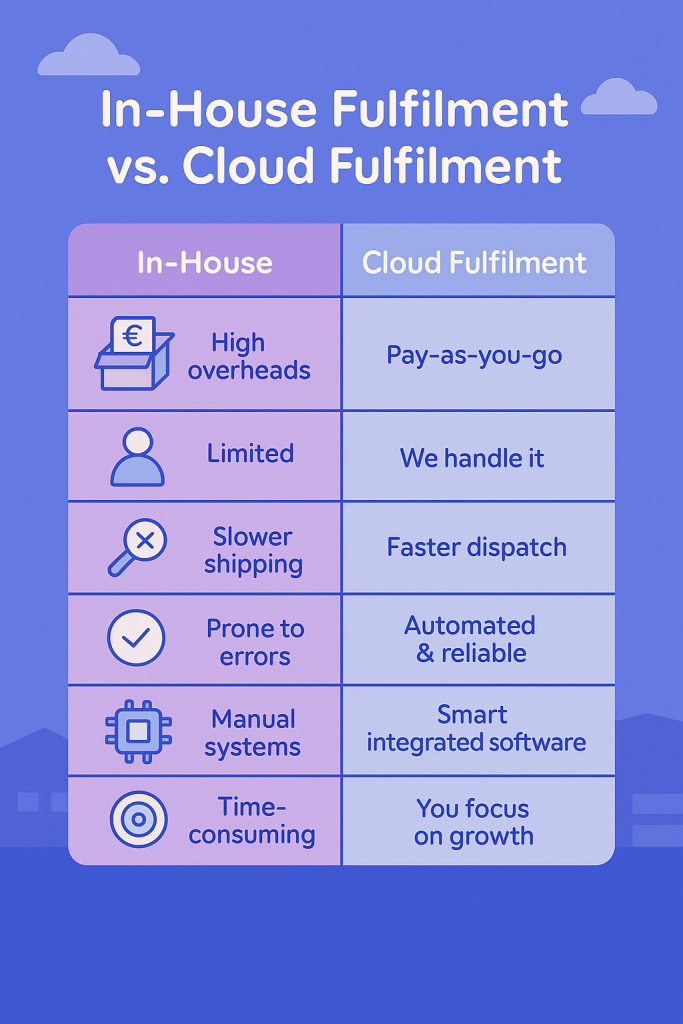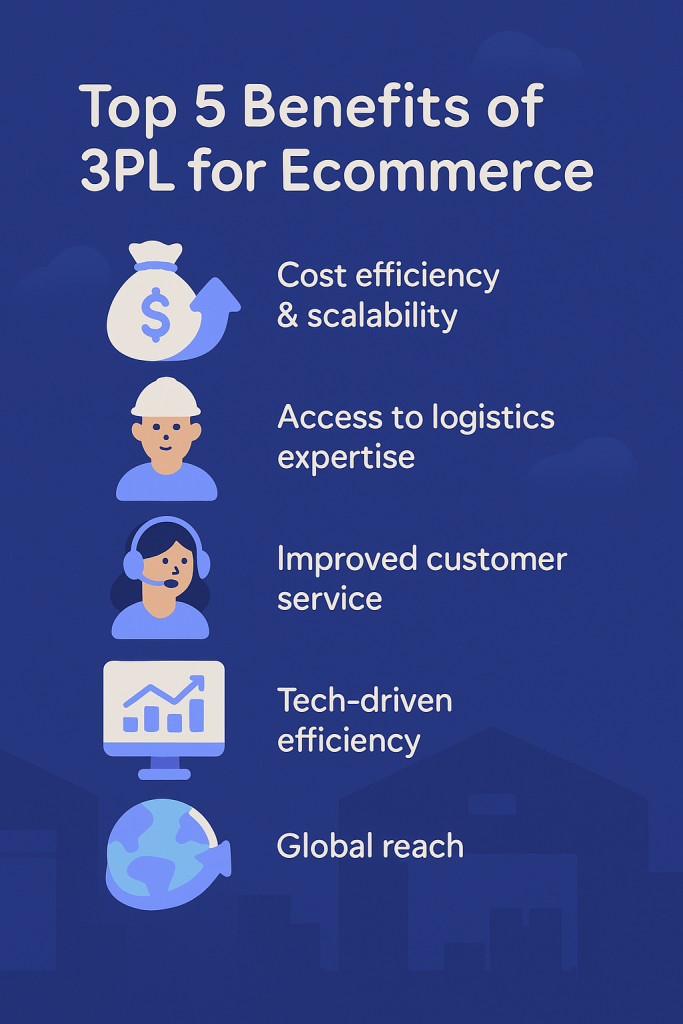Article Summary:
- 3PL offers cost savings and scalability for growing eCommerce businesses.
- Expertise from 3PL providers streamlines logistics operations.
- Improved customer service through faster and more accurate fulfilment.
- Technology integration enhances inventory tracking and efficiency.
- Global reach allows easy international expansion and shipping management.
- Challenges include supply chain visibility, rising costs, and last-mile delivery.
- The right 3PL provider can help overcome challenges and boost growth.
Understanding the Benefits and Challenges of 3PL for Growing eCommerce Businesses in the UK
In the ever-changing world of eCommerce, managing logistics efficiently is key to business success. As online retailers scale up their operations, logistics management becomes increasingly complex and resource-intensive. One effective solution that has become a cornerstone of modern eCommerce logistics is third-party logistics (3PL).
In this article, we’ll explore what 3PL is, its benefits and challenges, and how partnering with a 3PL provider like Cloud Fulfilment can help businesses scale efficiently while keeping operational costs under control. We will also address how eCommerce businesses in the UK can make the most of 3PL services to meet growing customer demands and improve operational efficiency.
What is 3PL and How Does It Benefit eCommerce?
Third-party logistics (3PL) refers to the outsourcing of logistics functions to a third-party provider. These logistics functions typically include warehousing, order picking, packing, inventory management, and shipping. A 3PL provider, such as Cloud Fulfilment, handles these essential tasks on behalf of eCommerce businesses, freeing up time and resources for business owners to focus on their core operations like sales and marketing.
The Purpose of 3PL for eCommerce
The purpose of 3PL is to help businesses streamline their supply chain and logistics operations. By outsourcing key logistics functions to an expert provider, businesses can reduce operational costs, enhance customer satisfaction, and improve scalability. In addition, 3PL allows businesses to take advantage of sophisticated technology, expertise, and industry knowledge that they may not have in-house.
For eCommerce businesses in the UK, 3PL is an invaluable tool for keeping up with the fast-paced, competitive market. Whether you’re an online retailer, a subscription box company, or a growing eCommerce business, 3PL allows you to improve the speed and efficiency of your operations while reducing costs.

The Benefits of 3PL for Growing eCommerce Businesses
1. Cost Efficiency and Scalability
One of the biggest advantages of third-party logistics (3PL) is the ability to scale without the high costs of managing fulfilment in-house. Icle Test, a growing healthcare eCommerce brand, turned to Cloud Fulfilment after struggling to find a partner who could handle medical product regulations. With our support, they grew from a handful of orders to thousands each month. As Simon Mason, Managing Director at Icle Test, says:
“Highly recommend Cloud Fulfilment for any start-up eCommerce business looking for a third party to help them grow and take all the hassle away.”
Managing your own logistics infrastructure — such as warehousing, staffing, and shipping — can become expensive and resource-heavy. By outsourcing these functions to a 3PL provider, businesses can reduce operational costs, avoid hefty upfront investments, and scale operations without the financial strain.
A flexible 3PL solution allows businesses to pay for only the services they need, making it easier to adjust to fluctuations in order volumes. This scalability is especially important for businesses experiencing seasonal peaks or those that are just starting to expand.
2. Expertise and Specialisation
Third-party logistics providers bring a wealth of expertise and specialised services to the table. Logistics operations require a deep understanding of inventory management, fulfilment processes, and compliance with shipping regulations. A 3PL provider, with a dedicated focus on logistics, has the knowledge to handle these aspects efficiently and effectively.
This expertise can be particularly useful for businesses in need of specialised services like kitting, packaging, or handling delicate products. For example, subscription box companies or those with unique packaging requirements can benefit from a 3PL provider that offers tailored solutions. Cloud Fulfilment excels in customised kitting and packaging, offering solutions ideal for businesses with specific product presentation needs. Additionally, their real-time inventory management systems provide complete visibility and control over stock levels, while scalable fulfilment solutions help businesses adjust to growth or seasonal demand fluctuations. With international shipping expertise, Cloud Fulfilment ensures smooth global operations, including full compliance with customs regulations.
3. Improved Customer Service
In today’s eCommerce landscape, customers expect fast, reliable, and accurate order fulfilment. Outsourcing logistics to a 3PL can significantly improve a business’s ability to meet these customer expectations. For instance, Underdays, a growing eCommerce business, partnered with Cloud Fulfilment to enhance its logistics operations. They appreciated Cloud Fulfilment’s reliability and fast but accurate pace of work, which allowed them to focus on other areas of their business with confidence. The proactive and hands-on approach of Cloud Fulfilment also ensured that any issues were resolved promptly, further enhancing Underdays’ ability to deliver a better customer experience.
4. Technology Integration
One of the hallmarks of 3PL providers today is their use of advanced technology to streamline logistics processes. Many 3PL providers use systems such as Warehouse Management Systems (WMS) that integrate with popular eCommerce platforms like Shopify, WooCommerce, and Amazon. These technologies help automate order processing, track inventory in real time, and improve overall efficiency.
Cloud Fulfilment takes it a step further with our advanced WMS, which integrates seamlessly with your eCommerce platforms, providing real-time updates and full visibility into your inventory. This system helps automate order processing, ensuring faster and more accurate fulfilment. By improving operational efficiency and reducing errors, Cloud Fulfilment ensures your logistics run smoothly and your customers stay satisfied.
5. Global Reach & Flexibility
Expanding into international markets can create complex logistics challenges, from navigating customs and VAT to managing delivery times and costs. Cloud Fulfilment simplifies global shipping by leveraging its partnership with Parcel Monkey Group, giving clients access to a broad network of trusted carriers and competitive international shipping rates. This allows businesses to offer fast, affordable delivery to customers worldwide, helping them stay competitive in global markets.
With strategically located warehouses in the UK, and close to major transport hubs, Cloud Fulfilment ensures quick domestic deliveries and efficient access to European and international destinations. For UK businesses selling into the EU, we also support compliance with IOSS (Import One-Stop Shop) regulations, making cross-border transactions smoother and helping avoid customs delays.
Combined with seamless integrations with leading platforms like Shopify, WooCommerce, and Amazon, our global fulfilment solutions give businesses the flexibility to scale into new markets without the burden of managing complex international logistics.

The Challenges of 3PL
1. Supply Chain Visibility and Disruptions
One of the primary challenges businesses face when outsourcing logistics is the potential lack of visibility across their supply chain. Disruptions, delays, and insufficient tracking can lead to inefficiencies and frustrated customers.
Many businesses struggle with maintaining real-time updates on inventory and order statuses, which can result in operational bottlenecks. However, a good 3PL provider will utilise advanced systems like Warehouse Management Systems (WMS) to give businesses more visibility and control over their logistics. These systems help businesses stay informed and react more swiftly to disruptions.
2. Rising Costs and Inflation
Another challenge with 3PL is managing rising operational costs, particularly in times of inflation. The cost of fuel, labour, and materials can all increase, affecting the overall cost of logistics. For businesses using 3PL services, this means that shipping costs may rise, and margins could be squeezed.
While a 3PL provider can help manage logistics more efficiently, rising external costs are something businesses must account for. Some 3PL providers offer flexible pricing models that can help businesses mitigate the impact of increased costs. However, it is essential for businesses to stay informed about pricing trends and work with their logistics partners to ensure the most cost-effective solutions.
3. Last-Mile Delivery and Customer Expectations
The last mile of delivery — the final step of transporting goods from a warehouse to the customer’s door — is often the most challenging and costly aspect of logistics. With the increasing demand for fast and reliable deliveries, meeting customer expectations can be a significant pressure for businesses.
The final leg of the journey is particularly important because it directly affects customer satisfaction. Delays or mishaps during this phase can lead to poor reviews, increased returns, and customer churn. Efficient last-mile delivery management requires coordination with reliable courier partners and sometimes advanced technologies to streamline the process.
4. Labour Shortages
The logistics industry has been significantly impacted by labour shortages, and this challenge has become even more pronounced during times of economic uncertainty. A shortage of staff in warehouses or for transportation can lead to delays in order fulfilment, mistakes, and reduced efficiency.
While automation has helped mitigate some of these challenges, many 3PL providers rely on a strong workforce to manage operations. During times of labour shortages, businesses may find that staffing issues can slow down fulfilment or increase costs. It’s crucial for eCommerce businesses to choose a 3PL provider with a solid track record of workforce management and technological support.
5. Sustainability Pressures
With growing consumer awareness around sustainability, businesses face increasing pressure to reduce their environmental footprint. In logistics, this involves adopting eco-friendly packaging, reducing carbon emissions, and optimising delivery routes to minimise fuel consumption.
As consumers continue to prioritise sustainability, businesses need to ensure that their logistics operations align with these values. Many 3PL providers are adopting more sustainable practices, but this remains a challenge for some businesses trying to balance cost and environmental responsibility.
By understanding both the benefits and challenges of 3PL, eCommerce businesses can make informed decisions about whether 3PL is the right choice for them. Outsourcing logistics can provide significant advantages in terms of cost, scalability, and efficiency, but businesses must also be aware of potential challenges such as visibility, rising costs, and last-mile delivery issues.
The right 3PL partner can help navigate these challenges while offering the support, technology, and flexibility needed to scale operations effectively.
For growing eCommerce businesses in the UK, 3PL offers numerous benefits, from cost savings to enhanced scalability. By partnering with a 3PL provider like Cloud Fulfilment, businesses can optimise their logistics, improve customer satisfaction, and focus on growth. While there are challenges to consider, the right 3PL provider will have the technology, expertise, and flexibility to help you navigate these obstacles effectively.
If you’re ready to scale your business and streamline your logistics operations, Cloud Fulfilment is here to help. With our expert solutions, flexible pricing models, and cutting-edge technology, we’re the ideal partner for your growing eCommerce business. Get in touch with an expert today.
Frequently Asked Questions About 3PL
What is 3PL and why do businesses use it?
3PL stands for third-party logistics. It refers to outsourcing logistics functions such as warehousing, picking, packing, and shipping to a third-party provider. Businesses use 3PL to reduce costs, improve efficiency, and scale their operations without investing heavily in infrastructure.
How do I know if my business needs a 3PL?
If your business is growing and you’re struggling to manage logistics in-house, a 3PL can help. Signs that you might need a 3PL include inventory management issues, difficulty keeping up with order volumes, and a need for international shipping solutions.
What are the main benefits of working with a 3PL provider?
The main benefits of working with a 3PL provider include cost savings, access to expertise, improved customer service, and scalability. 3PL providers can also help with technology integration and global reach, making it easier to expand your business.
How can 3PL help my business scale?
3PL can help your business scale by providing flexible and cost-effective logistics solutions. With a 3PL, you can adjust operations to match demand fluctuations, expand internationally, and optimise your logistics processes without the need for significant investment.
How does Cloud Fulfilment support international shipping?
Cloud Fulfilment supports international shipping by offering global fulfilment solutions and ensuring compliance with international shipping regulations, including the EU’s IOSS scheme. This makes it easier for your business to expand into new markets and serve customers worldwide.
What technology does Cloud Fulfilment use to manage orders?
Cloud Fulfilment uses a Warehouse Management System (WMS) that integrates with leading eCommerce platforms like Shopify, WooCommerce, and Amazon. Our technology ensures accurate inventory tracking, automated order processing, and real-time reporting.
How does a 3PL improve customer service for my business?
A 3PL improves customer service by providing faster and more reliable order fulfilment. With accurate inventory management, real-time order tracking, and faster shipping, a 3PL ensures that customers receive their orders on time, improving their overall shopping experience.


